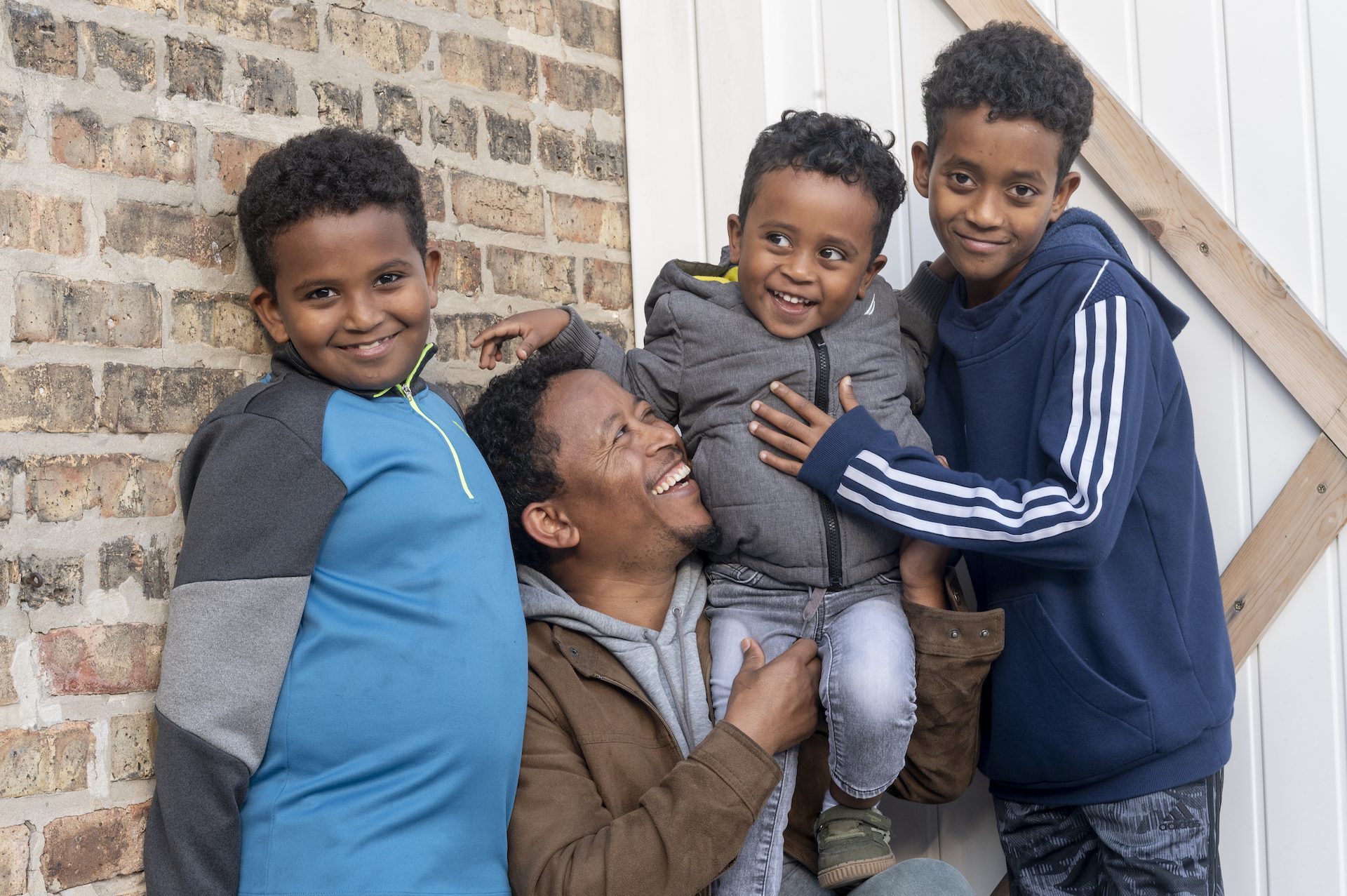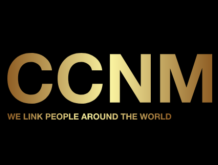He risked his life to flee Eritrea. Now, the father of three has started a new life in Chicago.
 Gonzalo Guzman for Borderless Magazine Recap from Borderless
Gonzalo Guzman for Borderless Magazine Recap from Borderless
Tsegay Gebreyohanes stands with his three sons, Eben Afeworki, 8, Abel Afeworki, 3, and Simon Afeworki, 12, behind the home he recently purchased in the Rogers Park neighborhood in Chicago, Ill., Oct. 20, 2023. As told to Diane Bou KhalilNovember 6, 2023As Told To, Black Immigrants Today
Pew Research estimates 1 in 10 Black people in the United States is an immigrant. In Black Immigrants Today, Borderless Magazine spoke to Black immigrants around Chicago about their homes, their lives, and the challenges they faced coming to the U.S.
Tsegay Gebreyohanes was in his early 20s when he first tried to leave Eritrea in 2008. He was among a mass exodus of young people leaving the northeastern African country, fleeing a lack of political, social, and economic freedoms — and forced military service. Over the past two decades, more than one million Eritreans have escaped what they call one of the world’s most repressive and authoritative governments.
Bordered by Ethiopia, Sudan and Djibouti, Eritrea is described as Africa’s North Korea. For over 30 years, the country has been ruled by Isais Afwerki, first elected president in 1991. Amid the ongoing conflict with Ethiopia, Afwerki, the commander-in-chief of the Eritrean Defence Forces, imposed mandatory national service for all Eritreans. The forced conscription has been one of the reasons many have fled the country.
Human rights groups have accused the Eritrean government of running a national network of jails and detention facilities like the one where Tsegay was detained for four months. The Eritrean government barred the United Nations from entering the country to investigate several allegations of human rights violations.
Borderless Magazine interviewed Tsegay, now 38, who shared his testimony of fleeing Eritrea to avoid military service, being imprisoned in Sudan, Egypt and Eritrea, and seeking safety and opportunity in the U.S. I left my home in Eritrea in search of freedom. My village of Ksad Emba is not far from the Ethiopian border. I traveled to Ethiopia on foot with nothing but my school ID and my dog, who was turned away at the border. I learned six months later from my family that he had returned home safely.
For two months, I stayed in the Mai Aini refugee camp in Ethiopia. The camp was filled with other Eritreans also fleeing our country. I left Ethiopia two months later. My goal was to reach Israel, but I first had to make a seven-day trek through Ethiopia and Sudan. I’m very strong. I grew up on a farm with mountains. I have fallen hundreds of times, burned my legs, and lived in poor conditions, but the journey to Sudan was far more challenging than anything I experienced.
Dozens of Eritreans, including eight women, were on this very dangerous journey where we all risked our lives. In our culture, you don’t leave anyone behind. Eritrean refugees were targeted by Ethiopian soldiers and civilians who took money and phones or attacked people like me fleeing our country. The only safe place was the refugee camp. Thankfully, I was safe from these types of attacks.
When we reached Sudan, we paid people to drive us to the Sudan-Egypt border. Among the caravan of cars with dozens of refugees attempting to cross, there were also other cars trailing behind transporting weapons and explosives. As we slept outside one night, an airstrike hit many of the vehicles in the caravan. We escaped and stayed in the Sudanese desert without water or food for days until we reached Kassala, Sudan. There, I was interrogated by Sudanese soldiers and sent to jail for two weeks before being deported back to my country.
Back in Eritrea, the government sentenced me to six months in prison. Over several days, I was moved through five prisons: two in Barentu, one in Prima Country and one in Asmara. At the fourth prison, I was given lentil water as food — my first meal in days. They transferred me to a fifth detention facility known as Wia military prison, an underground prison shaped like a concrete sewer. There was no light, no water, and little oxygen — just a tunnel. The temperatures were hot and humid. There were hundreds of people in one room, and we slept like sardines, one on top of the other.
Overhead, the underground prison was secured by guards with rifles, fences and a desert covered with jagged rocks and cactuses with sharp needles. In my four months at Wia, a group of prisoners came up with a plan to escape. We talked in code so others could not understand us. I knew the guards would shoot, but we were ready. We knew the risks. Just after midnight one night, hundreds of prisoners rushed through a door and scattered. We ran for our lives in the dark, barefoot through cactuses as guards fired their rifles. Some people were captured, while others, including myself, got away. The prison wasn’t far from where I lived, but I couldn’t stay home because the government would find me. I would rather die or be eaten by wolves than be captured by the Eritrean soldiers.
